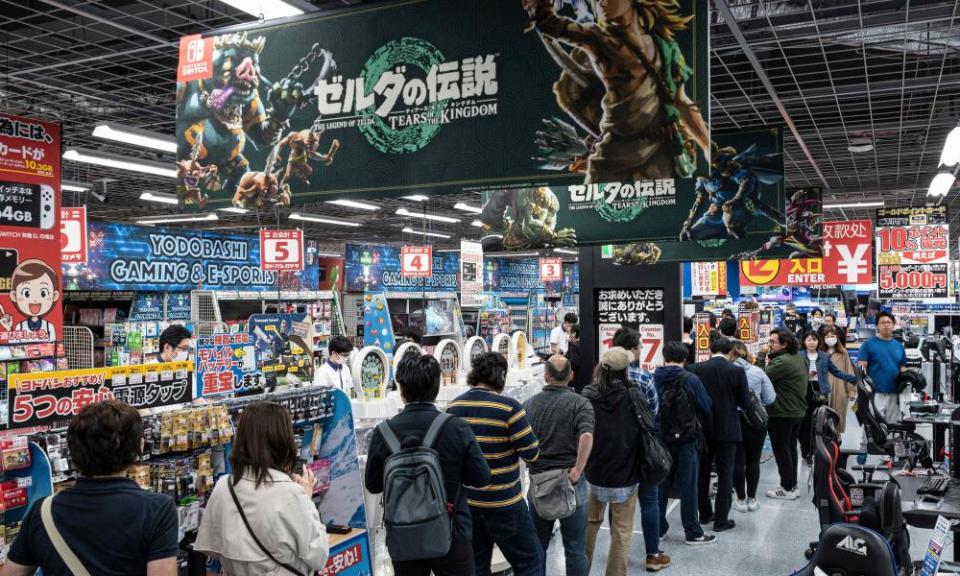‘Beyond expectation’: Nintendo’s latest Zelda title launches to critical acclaim

If university lecture halls and offices looked a little quiet on Friday, it may be down to Nintendo.
The Legend of Zelda: Tears of the Kingdom – the latest in Nintendo’s long-running series of vast, life-absorbing adventure video games – has launched for the firm’s Switch console to a chorus of critical praise.
On review aggregation site Metacritic, it currently has an average score of 97/100, putting it comfortably in video games’ top echelon. That makes it a game worth taking a day off work to play – or maybe even a week.
If Mario is gaming’s most recognisable face, the medium’s equivalent of Mickey Mouse, Zelda is more like Indiana Jones – clever, swashbuckling and much imitated. It is the connoisseur’s choice, a game whose puzzles and battles involve your intellect as much as your reflexes.
Tears of the Kingdom invites players to explore a fantasy kingdom, Hyrule, as elven hero Link, letting them chart their own path through the world and uncover its many secrets.
It is already being called one of the greatest video games; Trusted Reviews said it was “likely to go down in history as one of the best games ever to grace a Nintendo console”, and the games media’s longstanding behemoth IGN has called it an “unfathomable follow-up, expanding a world that already felt full beyond expectation and raising the bar ever higher into the clouds”.
Critics have said it offers a previously unimagined level of creative freedom, letting players fabricate their own weapons and madcap contraptions, from makeshift planes to flame-throwing shields.

Zelda producer Eiji Aonuma, who has been working on Zelda games since the mid-90s, believes that the series’ willingness to trust the player’s intellectual curiosity is the key to their appeal.
“A lot of time people tell me that when they play Zelda, there are these wonderful ‘I did it!’ moments, where they solve a puzzle and think they must surely be the only person in the world who could have cracked it,” he says. “I think if we provided too much guidance about how to do things, they wouldn’t feel that way. The feeling of satisfaction comes from exploring and figuring things out on their own – that’s the route to joy. In Tears of the Kingdom I believe that this aspect, this feeling, has become even stronger.”
The Zelda series’ developers at Nintendo are no stranger to breathless critical acclaim. Ever since it debuted nearly 30 years ago on the Nintendo Entertainment System, new entries in this series have often represented a leap forward in the creative and technological possibilities of video games. 1986’s The Legend of Zelda was among the first games that allowed players to explore as they saw fit rather than following a linear series of levels. Ocarina of Time, released in 1999, was the first to let players fight and explore in 3D, introducing innovations in its controls and world-building that are still being iterated by game designers today. And Breath of the Wild – of which Tears of the Kingdom is something of a sequel – took the concept of an open fantasy world and ran with it, conjuring an alternate reality in code for players to lose themselves in. Plenty of its players have spent more than 100 hours with it.
Despite how acclaimed these games have been over the years, Zelda was never Nintendo’s biggest money-maker. Throughout the 90s and 00s, they would sell between 5m and 9m copies – enough to have most game publishers cracking open the champagne, or at least the prosecco, but not enough to compete with Mario or Pokémon’s tens of millions.
But that changed with 2017’s Breath of the Wild, which launched alongside the Nintendo Switch console and sold more than 30m copies, more than three times as many as the former bestseller, Twilight Princess in 2006. Nintendo will be hoping that Tears of the Kingdom can repeat this success six years later; with 125m Switch consoles now sold, it stands a good chance.

 Yahoo Finance
Yahoo Finance 